Global coronavirus updates: China begins medical staff withdrawal from Wuhan after just one new case
The fronts in the battle have clearly shifted outside China as Beijing introduced fresh moves to contain the virus, with most number of cases now coming from outside its borders.
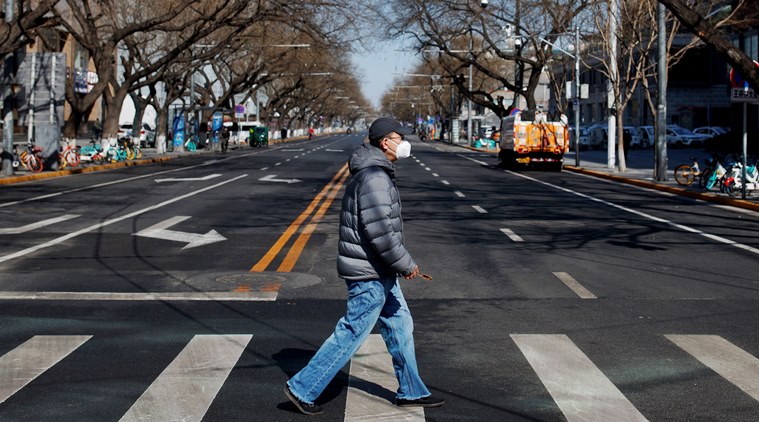 The Chinese city of Wuhan, which is at the epicenter of coronavirus outbreak, recorded just one new case today as officials said they believed the country was over the worst of the crisis. (Reuters)
The Chinese city of Wuhan, which is at the epicenter of coronavirus outbreak, recorded just one new case today as officials said they believed the country was over the worst of the crisis. (Reuters)
With borders across the world shutting down, schools and businesses closing and increasingly drastic restrictions on movement, millions of people were hunkered down Tuesday, heeding government calls to isolate themselves and slow the spread of the new coronavirus. From Southeast Asia to Europe to the Americas, people found their lives upended by lockdowns and social distancing.
The fronts in the battle have clearly shifted outside China as Beijing introduced fresh moves to contain the virus, with most number of cases now coming from outside its borders.
The Chinese city of Wuhan, which is at the epicenter of coronavirus outbreak, recorded just one new case today as officials said they believed the country was over the worst of the crisis. Another 20 cases were recorded around the country, including nine in Beijing. All were reported among people who arrived from overseas.
Here’s what the situation in China is at the moment
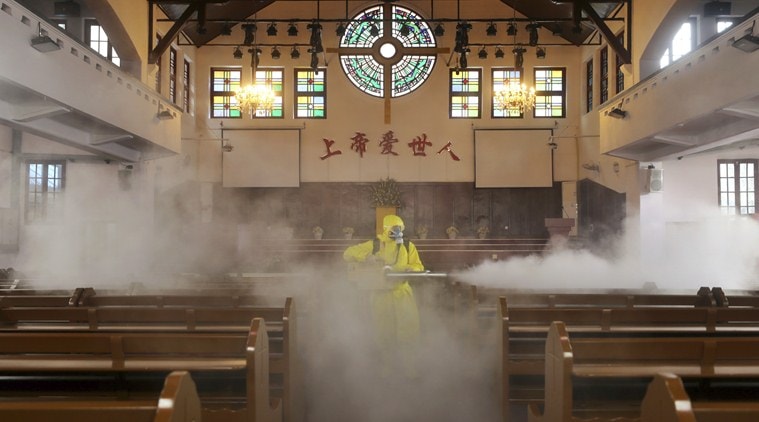
As of Tuesday, China still remains the hardest-hit with 80,881 infections and over 3,000 deaths. After China, Italy and Iran are the two worst-affected countries.
The virus that first emerged in China’s Wuhan city in the Hubei province in December last year has spread to 155 countries, infected 182,406 people and has claimed 7,154 lives, according to the Johns Hopkins Coronavirus tracker.
READ | Coronavirus is hiding in plain sight
More than 79,000 people have recovered from it so far, mostly in China. Today, China reported 21 new cases , 20 of them imported. Just one new case was confirmed in Wuhan, the Hubei provincial capital where the illness was first detected in late December.
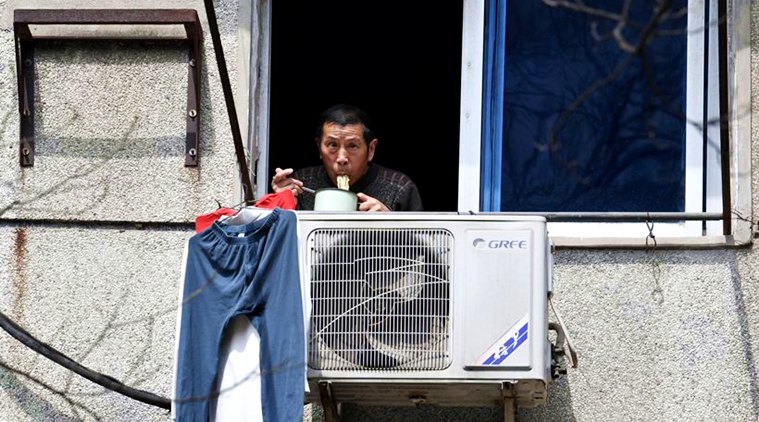 At a residential compound in Wuhan, a man looks out of the window while eating noodles. To date, the total accumulated number of cases of coronavirus in mainland China is 80,813. (Reuters)
At a residential compound in Wuhan, a man looks out of the window while eating noodles. To date, the total accumulated number of cases of coronavirus in mainland China is 80,813. (Reuters)
With cases dropping, here’s what China is doing to counter COVID-19
As the overall number of cases from China drop, Beijing has announced that all inbound, non-transit travellers to Beijing need to be isolated for 14 days at designated quarantine venues, mostly hotels in the city. Although the imported cases of infections in mainland China are still modest in number – 143 so far – authorities are concerned that virus carriers could trigger a second wave.
READ | Explained: Putting a cost to coronavirus
Spain is now the fourth-most infected country, surpassing South Korea, where new cases have been subsiding.
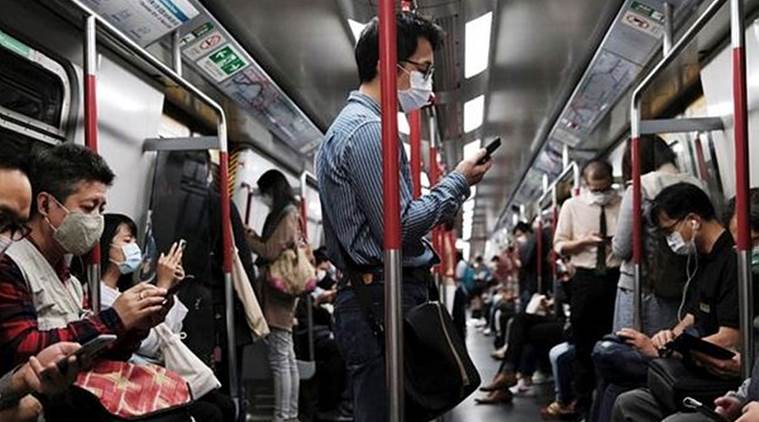 People wear protective masks in an MTR train, following the outbreak of the new coronavirus in Hong Kong, China March. (Reuters)
People wear protective masks in an MTR train, following the outbreak of the new coronavirus in Hong Kong, China March. (Reuters)
Fresh moves to contain the virus came even as Wuhan, the central Chinese city where the virus was first detected late last year and which has been under lockdown for weeks, reported just one new case on Tuesday. Other Chinese cities have adopted similar measures, even as authorities work to restart industries that are key to global supply chains.
READ: World should learn lessons from China in coronavirus fight: China Daily
China’s Chongqing and Shandong city, for example, will quarantine all overseas arrivals, as reported by the official Xinhua news agency. As per the directive, the two cities will require all overseas arrivals to be quarantined in designated locations or residences for 14 days.
Following this, China’s foreign ministry has also advised Chinese citizens to avoid travel to countries posing a high risk in the global coronavirus pandemic in an effort to tighten checks on arrivals to guard against imported cases of the disease.
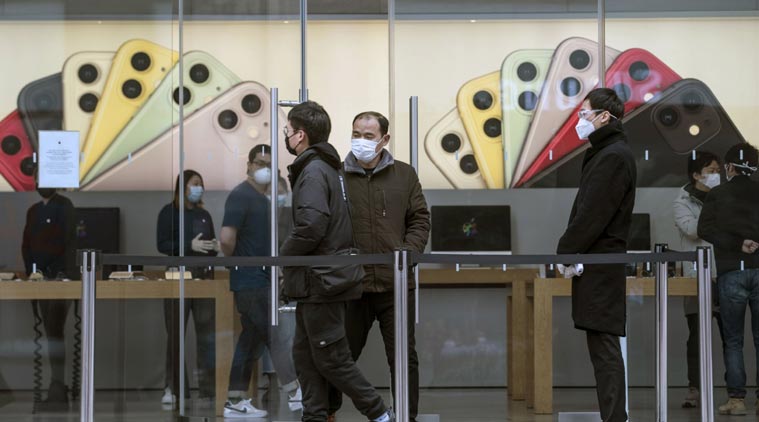 Customers wearing protective masks exit an Apple Inc. store in Shanghai, China, on Monday, March 2, 2020.
Customers wearing protective masks exit an Apple Inc. store in Shanghai, China, on Monday, March 2, 2020.
The foreign ministry said Chinese citizens should avoid travel to heavily affected countries in Europe, as well as the United States, Iran and Korea, the foreign ministry said in a post on an official WeChat account.
South Korea’s worst-hit city Daegu reports less cases
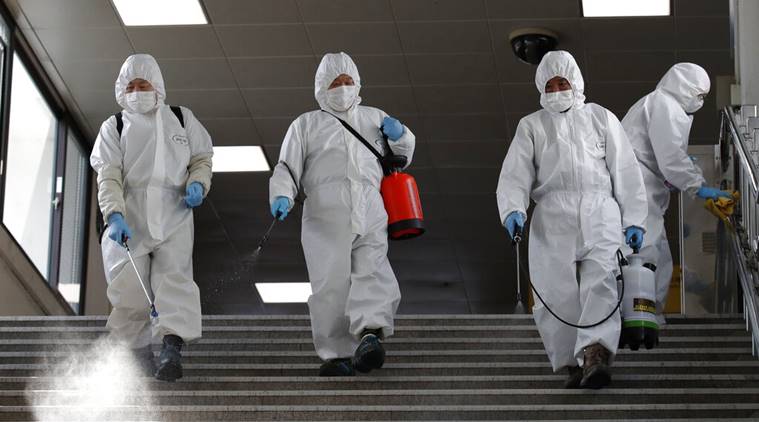 Workers wearing protective gears disinfect as a precaution against the new coronavirus at the subway station in Seoul, South Korea, Friday, March 13, 2020. (AP Photo/Lee Jin-man)
Workers wearing protective gears disinfect as a precaution against the new coronavirus at the subway station in Seoul, South Korea, Friday, March 13, 2020. (AP Photo/Lee Jin-man)
Infections have continued to slow in South Korea’s worst-hit city of Daegu. The city’s daily increase of COVID-19 infections has declined to double digits after averaging around 500 new cases per day in early March. But there’s concern over a steady rise of infections in the Seoul metropolitan area, where clusters have emerged around an insurance company call center, a number of churches and a computer gaming room.
Spain logs nearly 2,000 new cases, as infections top 11,000: govt
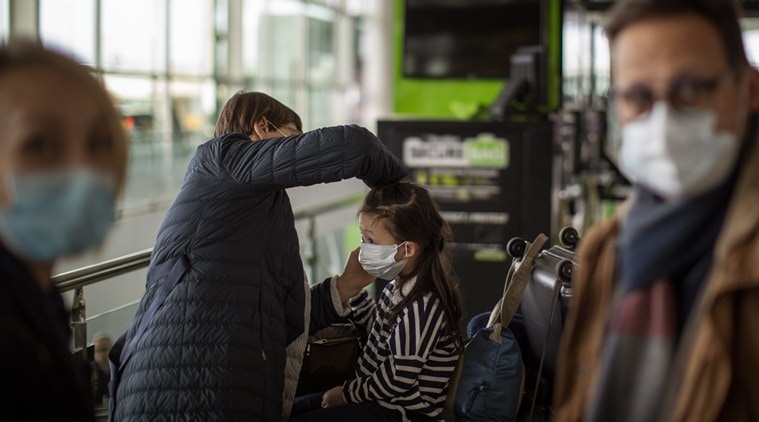 A woman fixes a mask to a child at Barcelona airport, Spain, Thursday, March 12, 2020. President Donald Trump, who had downplayed the coronavirus for weeks, suddenly struck a different tone, announcing strict rules on restricting travel from much of Europe to begin this weekend. (AP)
A woman fixes a mask to a child at Barcelona airport, Spain, Thursday, March 12, 2020. President Donald Trump, who had downplayed the coronavirus for weeks, suddenly struck a different tone, announcing strict rules on restricting travel from much of Europe to begin this weekend. (AP)
Spain on Tuesday confirmed nearly 2,000 new cases of COVID-19, sending the total spiralling past 11,000, with 491 deaths, the health ministry said. Over the past 24 hours, the number of people infected rose by 1,987, hiking the overall total to 11,178, the ministry’s emergencies coordinator Fernando Simon said, while indicating the number of people who had recovered stood at 1,098.
Malaysia reports first coronavirus death, one from mosque gathering
Malaysia reported its first two coronavirus deaths on Tuesday, including a man who attended a mass Muslim gathering linked to nearly two-thirds of the country’s infections. Total cases rose 120 to 673, the highest in Southeast Asia.
Explained: Once treated for coronavirus infection, can a patient relapse?
Of those, 428 are linked to an Islamic conference attended by about 16,000 people – including 1,500 from other nations – late last month at a mosque near the capital Kuala Lumpur.
Iranian state TV warns ‘millions’ could die from coronavirus
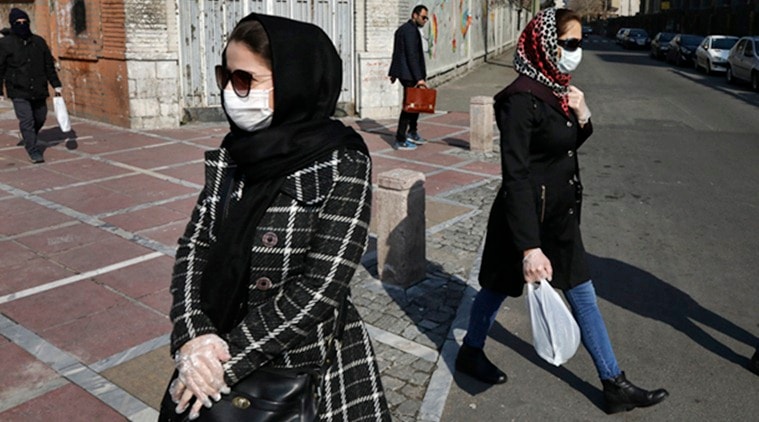 Pedestrians walk as some of them wear masks in downtown Tehran, Iran, Feb. 27, 2020. (AP Photo/Vahid Salemi)
Pedestrians walk as some of them wear masks in downtown Tehran, Iran, Feb. 27, 2020. (AP Photo/Vahid Salemi)
In one of it strictest warning yet, Iran suggested “millions” could die in the Islamic Republic if the public keeps traveling and ignoring health guidance. A state television journalist who also is a medical doctor gave the warning only hours after hard-line Shiite faithful the previous night pushed their way into the courtyards of two major shrines that had just been closed over fears of the virus.
Roughly nine out of 10 of the over 18,000 cases of the new virus confirmed across the Middle East come from Iran, where authorities denied for days the risk the outbreak posed.
An advisory by the US Centers for Disease Control recommends social distancing measures such as: reducing the frequency of large gatherings and limiting the number of attendees; limiting inter-school interactions; and considering distance or e-learning in some settings (which could be interpreted as serving the same purpose as working from home).
Bosnia declares nationwide state of disaster over coronavirus
Bosnia declared a nationwide state of disaster over coronavirus on Tuesday to enable coordination of emergency activities between its two autonomous regions, Prime Minister Zoran Tegeltija said. The Bosniak-Croat Federation and the Serb Republic declared emergency situations on Monday separately each and introduced urgent measures to halt the spread of the disease. Bosnia has reported 26 cases of the new virus so far, with no fatalities.
Europe to shut borders as lengthy virus crisis looms
European Union leaders meeting via videoconference on Tuesday are likely to seal off Europe’s external borders and stress a “whatever it takes” approach to easing the economic fallout as the continent braces for a long coronavirus crisis. France was going into lock down on Tuesday to contain the spread of the disease as the death toll in Italy jumped above 2,000.
The EU has scrambled to find a coherent response to the outbreak, with countries imposing borders checks in what is normally a zone of control-free travel, limiting exports of medical equipment or failing to share key information swiftly.
The executive European Commission warned member states that this was just the beginning of the crisis and Germany said it would take “months rather than weeks”, diplomats said after talks on Monday evening to prepare for Tuesday’s call.
US Senate weighs emergency spending amid outbreak; administration urges more
 Workers from a Servpro disaster recovery team wearing protective suits and respirators wait outside before entering the Life Care Center in Kirkland, Wash., to begin cleaning and disinfecting the facility, Wednesday, March 11, 2020, near Seattle. The nursing home is at the center of the coronavirus outbreak in Washington state. (AP Photo/Ted S. Warren)
Workers from a Servpro disaster recovery team wearing protective suits and respirators wait outside before entering the Life Care Center in Kirkland, Wash., to begin cleaning and disinfecting the facility, Wednesday, March 11, 2020, near Seattle. The nursing home is at the center of the coronavirus outbreak in Washington state. (AP Photo/Ted S. Warren)
The U.S. Senate on Tuesday prepared to weigh a multibillion-dollar emergency spending bill passed by the House of Representatives offering some economic relief from the coronavirus outbreak as the Trump administration pressed for billions more.
The House over the weekend passed a measure that would require sick leave for some workers and expand unemployment compensation among other steps, including nearly $1 billion in additional money to help feed children, homebound senior citizens and others.
The Trump administration wants massive additional spending to help blunt the impact of the fast-spreading disease, which has sunk global financial markets and caused sweeping disruptions to the U.S. economy.
WHO calls for ‘boldest actions’ from all European countries over virus
The World Health Organization’s (WHO) regional office for Europe on Tuesday said there is a need for bold measures in all European countries, calling the continent the “epicentre” of the new coronavirus pandemic. “Every country, with no exceptions, needs to take their boldest actions to stop or slow down the virus threat,” Hans Kluge, WHO Regional Director for Europe, told a press conference.
EXPLAINED | What is a pandemic?
Coronavirus: UK advises against all non-essential travel for 30 days
The UK government on Tuesday launched an advisory for British nationals to avoid all non-essential international travel for an initial 30-day period as part of toughening measures to tackle the coronavirus outbreak in the country, which has reported 55 deaths from COVID-19.
UK foreign secretary Dominic Raab told the House of Commons that the Foreign and Commonwealth Office (FCO) has taken the decision as a number of countries, including India, has put travel and visa restrictions in place.
“UK travellers abroad now face widespread international border restrictions and lock downs in various countries,” Raab said.
- 01
- 02
- 03
- 04
- 05































